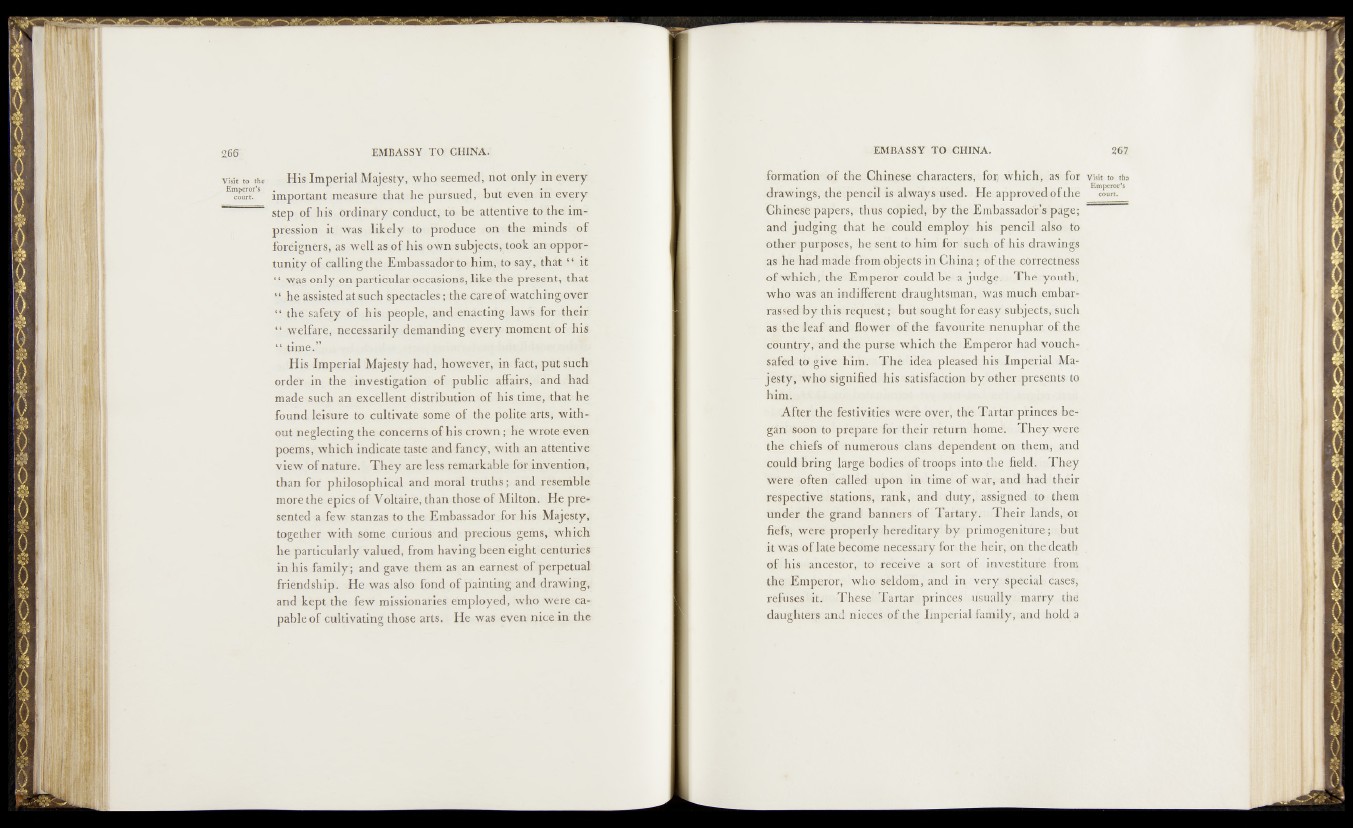
EMBASS Y >W CHINA.
His ImperialMajesty, whaseemed,not only in every
important imeasure -diat'he pkrkuied^ bA 'w eriiin evgry
step pf h i s a t t e n t i v e i t P the impression
it was likely th e produce on theminds of
foreigners, as well as of his c?wn subjects* took an opportunity
of calling the Emb ass ador tosh im,r to -say ^thatsS1 ‘ it
*, ‘ \yas only on particular-occasions, like, the presents dhalt
“ he assisted at$óch spectacles ; the careof watehing over
“ thé safety ofnhis people, and tenanting, Jaws for thgjgr
1 ‘ welfarejvnecessarily demanding everymoment nfrhis
‘ ‘ -time.”
His Imperial Majesty had, however^ inslaéfc^pnt sueh
order in the investigation of public affairs,'«and had
madetiiaeh an excellent distribution of h>i«;itimev?thafr<lfie
found leisure to cultivate some of the polite* arts, without
neglecting the concerns of his crown ; he wrote'evem
poéms, which indicate taste and ‘fancy , with an Attentive
view of nature. They aredessremarkable for invention,
than for philosophical and moral truthsaf£d* resemble
moretbte^pjcs of Yoltaife, than thoserof Milton. He pre**
seated a few stanzas to the EmbassadorTor his M^estyi
together with some curious and precious gems, which
he particularly valued, from having been eight centuries
in his family; and gave them as an earnest of perpetual
friendship. He was also fond of painting afMi!drawings
and kept the few missionaries employed, who were>ea-
pable of cultivating those arts. He was even nice in the
EMBASSY TO CHINA. 267
formation- .of tekeeGhinese. characters,-, for/ which 5 jasu for
drawing^,i^theipeiicM is alway f^feedv H© approved of the
Chinese i^flerspffeh us copied^ by the ;Embassadorssfipig6*
and judgi-Wg^tiaat her'enuldltfemploy. his pencil ital so „to
othen,pu<pp®JSe%hef e~htlfctcj!, him for if$rcl|,'©rfbhas-drawings
as he head madedkom objieptsiii^Chjina ^;©f*t|rp ,eoBceefcni)ps
of which#tl|<is®®lperorrectoildibfeia j udigi^pTh^i-yonth«
whp^'wK®®hdndifferen(Prdra?u^hAsm'ari,-'was<.m‘Uchf^tohii|'I
ra-Sshd by this^'eqbdst *e butf%U^KferieEs^su:1iy^tS',;'su,e.h
aS the^&af and flower of the .favoiirite nenuphar o&the
country, and the purse, which the Emplerm^hpkfwch-
srfgdrto give him. The idea pleasedfhi^mpepal 'Majesty,
who1 signified his rsAtidfactidn. hy^frherjpaaesents- to
him ty t
After’,the festivities- yeEehyirhthfe' Tarfetr-ipSamses began
soon to-prepare f01 theiir return •home'. They*>\yoa*e
the chiefs.of numerous^clknsadcp^ndention thej% and
could bring »laFgP bodies* of troops, into the ^EeW. > jThey
were ^ofteniicAlled upon in time* of iwar;-and; had their
respectivenstations, .rank, and duty;iassig*ied;>’to thgg§|.
under the grand banners of Tartary. Tih&i^jlanldsg*@:r
fiefs,- were^properly hereditary b y primog©nitnrev.;a,Hi)it
it was of latehecdme necesSafy for the heir; .on tike'death
of his * ane'estbr^'toi received^rs©rtss^l£ iniv.estitufe>-from
the-Em^erorr whoi seldofti, and in vmyyip^eiaL dases?
refuses «it. uThesehlBartar prinbekhrfeuallyj’marRy the
daughter and- niehe&gf the IinperiakfamiJIy, and hold; a
Ylsit:to tha
Emperor’s
c ou r t . ,.